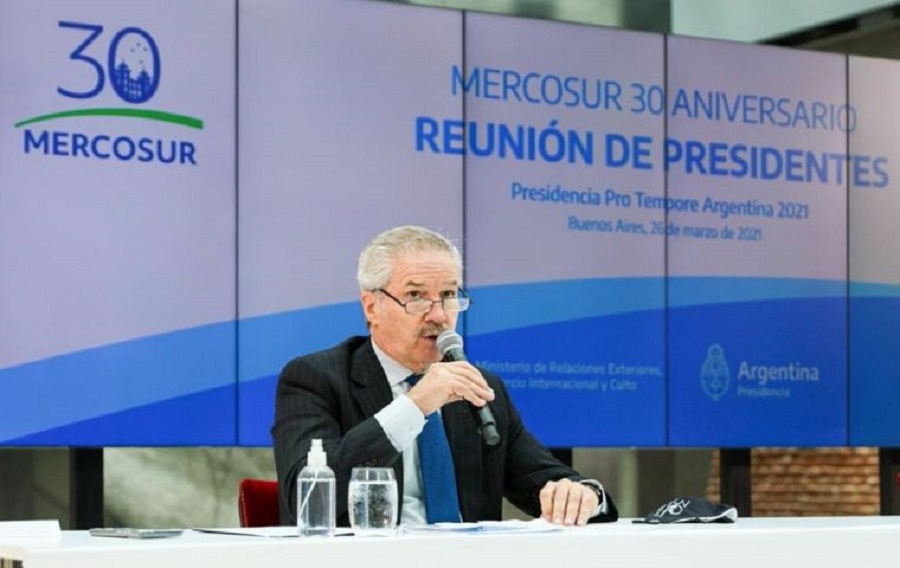RIO DE JANEIRO, BRAZIL – At a high-level MERCOSUR meeting on Monday, April 26, Argentina, Brazil, Paraguay and Uruguay got fully involved in the thorny discussion of the issues on the South American bloc’s trade agenda that cause the greatest differences among the four partners.
Two very specific issues were on the virtual meeting’s table for discussion by foreign and economy ministers of the four countries: the reduction of the common external tariff (TEC) and the flexibility of trade negotiations with third markets.

These are not new issues on MERCOSUR’s agenda, but this is the first time that the ministers have focused on their discussion since the presidential meeting held on March 26th to celebrate the 30th anniversary of the bloc’s foundation, at which the differences between the member states on these points became clear.
FLEXIBILIZATION
Uruguay and Brazil have been raising the need to relax the rules that prevent MERCOSUR member countries from negotiating trade agreements with other markets independently, rather than as a bloc.
In fact, at the extraordinary meeting of the Common Market Council (CMC) on Monday, Uruguay presented a formal proposal for relaxation which, according to Montevideo, has Brazil’s “full support”.
According to the Uruguayan Foreign Ministry, its proposal will be studied by the coordinators of the Common Market Group (GMC) “in order to generate the inputs that will enable decisions to be taken at the next meeting” of the CMC which, according to Montevideo, will be held in person in Buenos Aires in the second half of May.
Argentina, which holds the presidency of the bloc this semester, insists on negotiating “jointly with a united MERCOSUR”, as stipulated in the Treaty of Asunción, the bloc’s founding agreement, but agrees to make external negotiations more dynamic.
To that end, Argentine Foreign Minister Felipe Solá on Monday proposed that the GMC draw up a proposal for an external negotiations plan that identifies priorities for MERCOSUR’s external agenda and submits a report on the status of the different negotiations.
REVISION OF THE EAC
The proposal presented on Monday by Uruguay also includes changes to the TEC, whose revision process began two years ago.
The bloc’s maximum tariff is 35%, but the average applied is 12%, compared to a global average of 5.5%. In addition, it is levied on imports of intermediate and capital goods, with rates of up to 20% that make local production more expensive, affecting the competitiveness of MERCOSUR manufactures.
Uruguay did not disclose details of its proposal regarding the TEC, but said that it is also supported by Brazil, a country that has been pushing for a substantial and broad tariff reduction.
On this point, they also disagree with Argentina, traditionally more protectionist, which on April 7th presented a proposal for more moderate and selective reductions that would not affect domestic manufactures unable to compete with imports from other markets.
At Monday’s meeting, Solá explained that his country’s proposal is based on a “segmentation of the tariff universe”, with “a recommendation of greater reductions in inputs and raw materials, and lower reductions in final goods.”
AWAKENING FROM THE DREAM
Uruguayan President Luis Lacalle Pou, who a month ago stated that MERCOSUR should not be a “burden” for the group’s members, said on Monday that his country’s proposal seeks to allow that, if a partner wants to advance in a trade negotiation and the others do not, it can do so in order to expand the market.
The insistence comes at a time when the bloc’s economies are severely hit by the effects of the Covid-19 pandemic and feeling the frustration of meager gains on trade, with an agreement with the European Union facing serious hurdles at the review stage.
“We agree that we had a sleeping MERCOSUR, and it is important to wake it up. Here it is waking up, and it is important that it is a good awakening that advances on the basis of consensus, recognizing the historic moment of pandemic that is being experienced,” said Argentine Minister of Economy Martín Guzmán.

